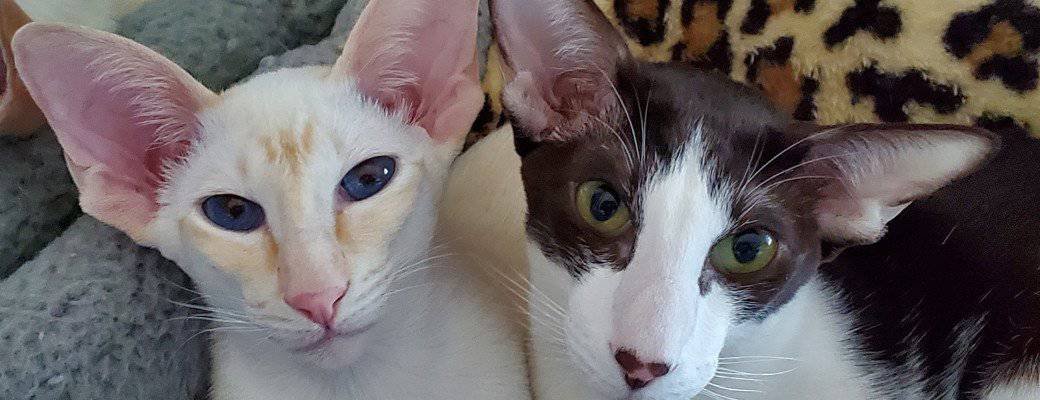One of the most common things new Siamese owners ask me is, “Should I get a second cat?” And often right after that: “Will my Siamese even like another cat?”
Having bred and lived with Siamese and Oriental cats for many years, I can say this with confidence: Siamese cats often do brilliantly with feline companions, especially when they’re introduced properly and the match is right.
But — and this is important — these are cats with strong opinions. They’re social, vocal, and emotionally complex. If introductions are rushed, or the other cat isn’t a good fit, things can go sideways quickly. That’s not a breed problem... it’s just classic cat politics.
So, let’s break down how Siamese cats typically respond to other cats, how to choose the right companion, and how to set things up for a smooth introduction.


Are Siamese Cats Social with Other Cats?
In general, yes — Siamese cats are one of the most sociable breeds. They thrive on company and interaction. Left alone for long periods, they can become anxious, bored, and vocal. Many do far better in pairs or small groups, especially if raised that way from kittenhood.
In my breeding experience, littermate pairs often go off to homes together and become lifelong companions. I’ve even had Siamese cats form tight bonds with unrelated cats — even across breeds — when the introductions were done slowly and thoughtfully.
That said, not every Siamese will instantly welcome a new feline into their territory. Like humans, they have personalities, preferences, and quirks. Some are more territorial, others more laid-back. Age, gender, and previous experiences all matter.
The Benefits of a Second Cat for a Siamese
Adding a second cat (or having two from the start) can offer several benefits:
Companionship when you’re out of the house
Play that meets their energy needs
Social stimulation that reduces boredom
Reduced behavioural issues, like yowling or over-grooming
I've seen many behavioural problems improve or disappear entirely when a lonely Siamese is paired with a suitable friend. One kitten I placed, named Finn, used to cry for hours when left alone — but once his owners added a playful little Oriental girl into the mix, he settled within days.


Choosing the Right Companion for a Siamese
This is key. Siamese cats are intense — smart, confident, vocal and energetic. They generally do best with other cats who can hold their own and enjoy the same pace of life.
Best companions:
- Another Siamese or Oriental
- A similar-aged kitten or young adult cat
- Confident, playful breeds like Bengals or Burmese (if well-socialised)
- Some domestic shorthairs with playful, easygoing natures
Less ideal companions:
- Very timid or nervous cats (may feel overwhelmed)
- Older, sedentary cats who don’t enjoy rough-and-tumble play
- Territorial or dominant cats who don’t enjoy sharing space
It’s not about breed snobbery — it’s about energy levels and communication styles. Siamese cats are very expressive, both vocally and physically. They do best with cats who "speak their language".
Can You Add a Second Cat Later?
Yes — but go slowly. A lot of people add a new cat when their Siamese is already an adult, often because the cat seems lonely or restless. It can work very well, but you need to introduce them properly.
Introducing Siamese Cats to Companions
Here’s the method I recommend, based on years of experience:
Step 1: Separate Spaces
Set up a safe, quiet room for the new cat. Give them everything they need: litter tray, food, water, hiding spots, and toys. Let them settle in for a few days without meeting your Siamese face-to-face.
Step 2: Scent Swaps
After a day or two, swap bedding or toys between the cats so they can sniff each other’s scent without direct contact. You can also gently rub a cloth on one and leave it near the other.
Step 3: Doorway Introductions
Let them hear and smell each other through the door. Use treats or play to create positive associations.
Step 4: First Meetings
Start with short, supervised sessions in a neutral area. Keep it calm and let the cats choose how close to get. Watch body language closely — tails, ears, posture — and separate at the first sign of tension.
Step 5: Gradually Increase Time Together
If all goes well, build up the length and frequency of interactions. Keep food and litter separate at first, and don’t force them to share space until they’re ready.
Most cats take a few weeks to fully adjust, though kittens and younger cats may bond much faster.


What If They Don’t Get On?
Sometimes, even with the best planning, cats don’t become best friends. That’s okay. Coexisting peacefully is still a win.
Give them:
- Separate resources (food, litter, beds)
- Escape routes and vertical space
- Time and patience
In rare cases, a serious personality clash may mean a rehoming decision. But with slow, respectful introductions, most Siamese cats will at least tolerate — and often thrive with — feline companions.
Signs It’s Working
You’ll know things are going well if you see:
- Curiosity without aggression
- Mirroring behaviours (eating, sleeping near each other)
- Play invitations like chasing, wrestling, or tail flicks
- Grooming or sleeping curled up together
Even if they don’t become cuddle buddies, many Siamese cats feel more secure and relaxed with another cat in the home.
Final Thoughts: Should I Get a Second Cat for my Siamese?
Siamese cats are incredibly social creatures. While not every individual wants a friend, many thrive with feline companionship — especially if introduced properly and matched with the right personality.
Don’t rush the process. Let your Siamese set the pace, and don’t expect instant bonding. But if you get it right, you’ll be rewarded with a more content, enriched, and confident cat... and quite possibly a pair of partners-in-crime.
I always say: Siamese cats don’t just tolerate company — they flourish with it.
faqS: Siamese with other cats
Often yes, especially if introduced properly. They are social cats that enjoy companionship.
Some can be, particularly if they haven’t shared space before. Slow, scent-based introductions help.
Yes, littermates or kittens of similar age usually bond quickly and provide great companionship for each other.
It varies — from a few days for easy going kittens to a few weeks (or more) for adult cats.
Some do, especially if you’re home a lot — but many benefit from having a feline friend for company and stimulation.
